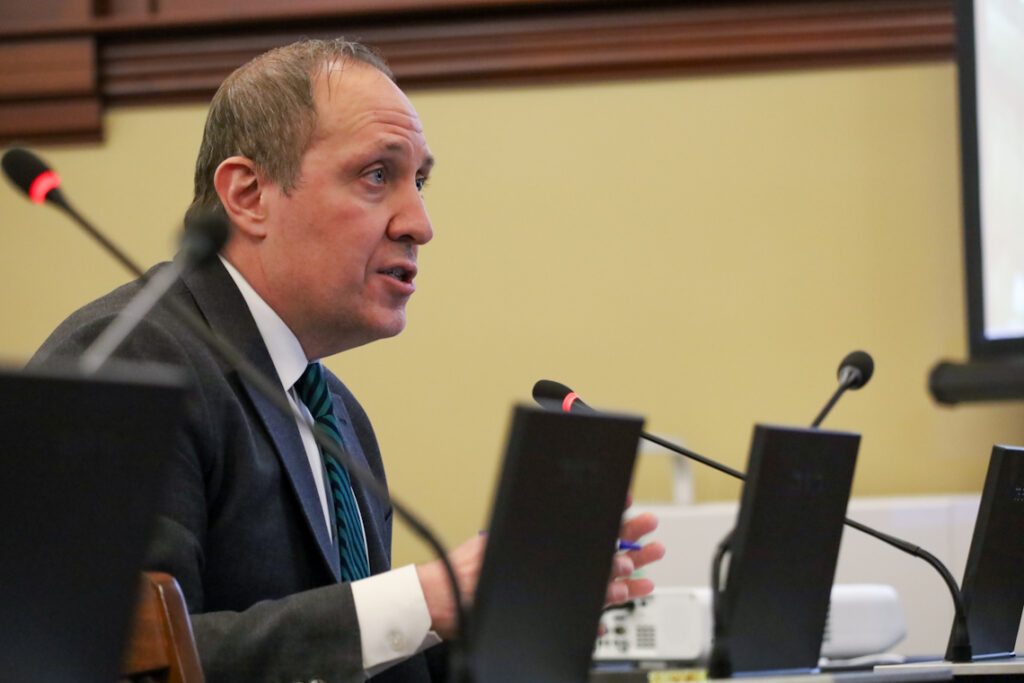In the face of mounting concerns about Illinois’ capacity to achieve its renewable energy targets, state regulators and legislators convened recently to deliberate on potential strategies for managing the energy sector. The discussion comes at a time when the state anticipates a decline in electricity production while energy consumption rises, driven partly by the high demand from data centers.
Executive Director of the Illinois Commerce Commission (ICC), Jonathan Feipel, underscored the urgency of the situation, stating, “If we all sat and did nothing, we would have a significant problem when we get to 2030.” The ICC plays a vital role in overseeing the state’s electric and natural gas utilities and ensuring compliance with Illinois’ renewable energy goals.
To address the challenges, Feipel expressed optimism about meeting the clean energy objectives by expanding renewable energy sources, enhancing energy efficiency programs, and innovating electricity pricing. He emphasized the need for strategic planning, saying, “We have to think really thoughtfully around how we bring all those tools to bear.”
Rep. Carol Ammons, a Democrat from Urbana and chair of the House Energy and Environment Committee, echoed Feipel’s sentiments. She intends to enhance existing energy and climate legislation, namely the 2021 Climate and Equitable Jobs Act (CEJA) and the 2016 Future Energy Jobs Act (FEJA), which set timelines for transitioning to renewable energy and phasing out fossil fuels.
Ammons also highlighted the importance of focusing on workforce diversity to foster a clean energy economy. “Balancing the things that are working with CEJA and tweaking where they are not,” she explained, aiming to refine and build upon the current frameworks.
However, the push for renewable energy development has not been without opposition. Some Republican committee members, such as Rep. Dave Severin, R-Benton, and Rep. Brad Halbrook, R-Shelbyville, voiced concerns over rising energy costs and reliability issues since the enactment of CEJA. Halbrook remarked, “Republicans talked about what would happen if CEJA was enacted — that energy costs would go up, we would have less reliable sources of energy, it would drive jobs out of the state and it would provide that less clean energy would be imported into the state.”
Proposals on the Table
Lawmakers are considering several measures in the current legislative session, scheduled to end in May, to tackle Illinois’ energy challenges. Among these is a bill passed in January mandating a study on energy storage, a technology that could stabilize electricity supply from renewable sources during peak demand.
Feipel indicated that proposals for battery storage, previously omitted from CEJA, are likely to emerge in the General Assembly. Additionally, legislation is expected to align energy efficiency standards for Ameren, the downstate electric utility, with those of Commonwealth Edison (ComEd) in northern Illinois.
According to Feipel, investing in energy efficiency programs could significantly benefit consumers. “Every dollar you spend on energy efficiency programs actually saves customers two to three dollars,” he noted, suggesting an expansion of such initiatives.
Data Centers
One pressing issue is the escalating electricity demand from data centers, which Feipel described as “critically important” and challenging yet manageable. These facilities, essential for AI companies and other tech enterprises, are driving up energy consumption.
A recent report by environmental and consumer groups highlights the impact of data centers on energy costs and the transition to renewable energy. Abe Scarr, Energy and Utilities Program Director at PIRG, noted, “We believe there is great promise in AI generally, but it is important to distinguish between that and the specific generative AI platforms and their insatiable computing needs.”
The report also examines the financial incentives for data centers, which have surged under Gov. JB Pritzker, with $468 million in tax credits awarded between 2019 and 2023. Scarr urged a reconsideration of these incentives, stating, “Tax credits should end right away. We should slow down instead of incentivizing further.”
Original Story at capitolnewsillinois.com
